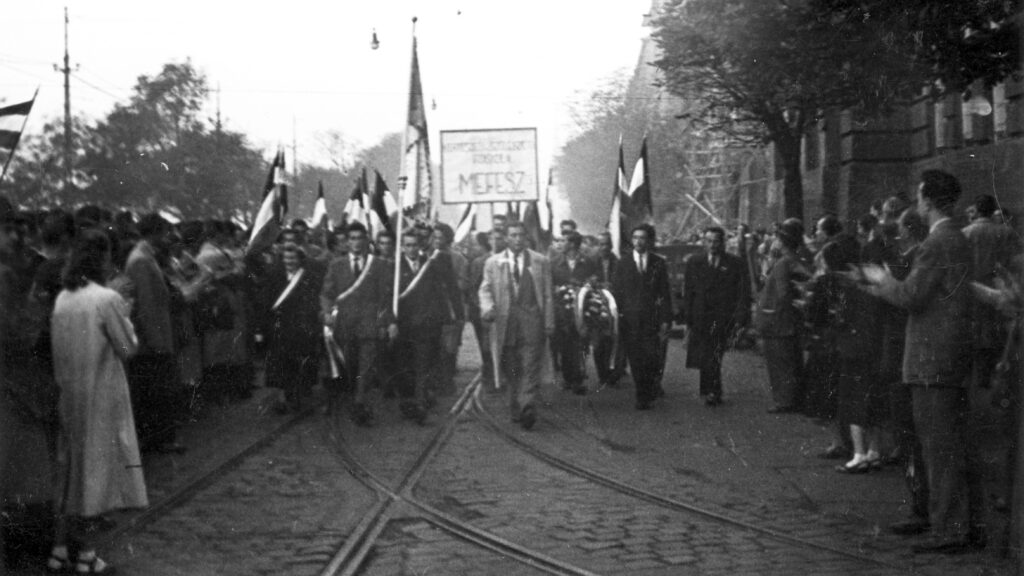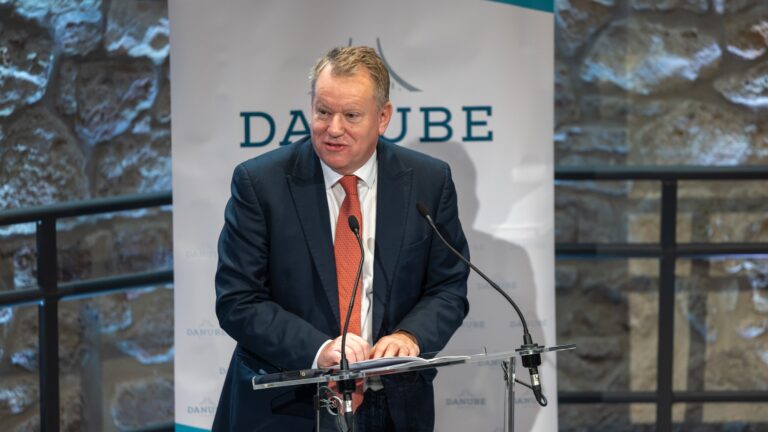During the first few days of adjusting to life in Budapest, I was recommended by many to visit the House of Terror Museum. There are other landmarks in the Hungarian capital remind its residents and visitors of the grim years of communism. As one walks through the city, there are statues honouring those of the 1956 Revolution and places like Liberty Square where a statue of Ronald Regan stands in front of the Parliament. The memorial reminds locals and tourists alike about the tumultuous history Hungary has endured and ultimately their liberation from Soviet Communist rule. But the House of Terror Museum is a truly special space, for a number of reasons.
Once the headquarters of the State Protection Authority under the Soviet occupation, and before that, of the fascist Arrow Cross Party, it immerses one into the oppression the Hungarian people faced during the fascist and Stalinist occupations. There are recordings of personal testimonies from Hungarians who saw their country become a war theatre and fall into the hands of the Nationalist Socialist Party or their Nazi equivalent, the Arrow Cross Party during WWII and then to Soviet Communism.
The museum showcases the horrors and tragedy of the Holocaust and the thousands of lives lost in the fight for freedom. The multiple testimonies describe how under the oppression of fascist and communist regimes, oppressive policies were slowly and stealthily implemented, until it became too late to resist. The Communists and their Social Democrat allies swiftly established absolute control, dissolved the parliament and altered the Hungarian constitution. All those who opposed the changes or were seen as a potential threat to the State were imprisoned, forced into exile, or executed.
The party then established the Political Police or the State Protection Authority that ‘protected’ the people from free political discourse. The museum goes on to describe how private property was virtually abolished, how Hungary fell into bankruptcy, and rations became the norm. Freedom of the press and freedom of assembly became extinct, and the school system began the indoctrination of the next generation to become obedient members of the youth communist organization.
Communism and socialism have distinctive traits and policies, which, when they raise their heads, ought to be a warning sign to the West. The United States, a free society, must realise that any society can dissolve into a communist one, therefore, the United States, just like Hungary, has a moral obligation to never forget the victims of communism. Hungary understands that the best way to prevent an evil from reoccurring is
to properly understand it and fully expose its darkness with the light.
This museum is a testament to and a reminder of a reality not so distant. Hungary, a beautiful country that was able to liberate itself, paid the ultimate price for freedom. Tourists of Budapest all ought to make a visit to this museum a priority because policies are beginning to emerge in the West that look eerily familiar to those described in the museum.
For instance, the American left is seeking what they call ‘Social democracy’ and claim it is not ‘democratic socialism’, but everyone knows it is indeed the same ideology.[1] This socialist ideology reflects that of Rousseau’s, who had an abstract idea of society’s restoration towards man’s ‘natural equality,’ but this idea is fundamentally flawed. As Edmund Burke, the prominent British political thinker, wrote in response: ‘their abstract perfection is their practical defect’.[2] According to Rousseau, for society to rid itself of its inequalities, the civilized man must be ‘forced to be free’ to embrace what Rousseau called the ‘General Will’ of the collective. A will that individuals are not to disobey as their ‘true freedom’ can only be found if they become public persons. A public person becomes an equal member of society, and these members produce a moral and collective body according to Rousseau’s philosophy.[3] The left in America still believes in this idea as if it has not been tried many times before and failed.
Those on the left in US politics claim that social democracy will allow the free market to flourish while simultaneously wanting to remove the free part and impose more governmental control.[4] While America suffers high levels of inflation, the left continues to call for heavier tax policies on the wealthy and aims to provide free universal education along with the dismissal of exorbitant collegiate student loans, wants open borders, and access to free universal health care that includes social policies regarding transgenderism.
Astonishingly, in a 2022 survey, the Pew Research Center found that Americans view socialism somewhat (30 per cent) or very (6 per cent) positively, and overall 36 per cent is in favour of it, with 56 per cent (!) of Democrats having a positive view.[5] Although this number has dropped from 42 per cent in 2019, there is
still more education to be done for Americans who have never experienced the true harsh horrors of far-left policies and governance.
Another 2023 Pew Research survey found that 57 per cent of US journalists say they are extremely or very concerned about potential restrictions on press freedoms in the country, including a third of journalists who say they are extremely concerned.[6] This comes as no surprise as objective reporting seems to have gone extinct in the United States and continues to fan the flames of the political divide.
Ultimately, the House of Terror Museum was thought-provoking and deeply moving for me as an American visitor. My heart felt burdened with sadness listening to horrific stories from people who endured communism and the Hungarians who were oppressed for many years. As I walk through the historic city of Budapest, I now look differently at the smiling faces of young Hungarians of my generation, whose parents fought for their freedom they enjoy today. The gift of freedom is not taken for granted here in Hungary; learning from the Hungarian experience, conversation on the importance of preserving freedom should be part of the public discourse within the United States, too.
[1] Although Social Democracy is seen as a compromise between capitalism and socialism, it draws the line closer towards socialism. The ideology has roots in Marxism and utopian socialism. See Ira Katznelson, ‘Considerations on Social Democracy in the United States, Comparative Politics 11, no. 1 (1978), pp. 77–99, https://doi.org/10.2307/421791, accessed 3 August 2023.
[2] E. Burke, F. Canavan, and E. J. Pane (eds.), Select works of Edmund Burke: A New Imprint of the Payne Edition (Vol. 2)., Liberty Fund, 1874. (Burke writes this regarding government and natural rights. However, this same sentence could apply to criticise the simplicity described by Rousseau’s version of human nature which builds Rousseau’s political philosophy.)
[3] ‘Since each gives himself entirely, the condition is equal for all, and since the condition is equal for all, no one has an interest in making it burdensome for others’, in John T. Scott (ed.), The major political writings of Jean-Jacques Rousseau: The two discourses and the Social Contract, The University of Chicago Press, Chicago, 2014, p. 173.
[4] ‘The Biden administration has proposed implementing a 25 percent minimum tax on the richest 0.01 percent of Americans, who the White House estimates pay an average annual tax rate of 8 percent and doubling the capital gains tax rate from 20 to 39.6 percent.’ The White House, Fact Sheet: The Biden Economic Plan is Working‘, Whitehouse.gov (6 February 2023), https://www.whitehouse.gov/briefing-room/statements-releases/2023/02/06/fact-sheet-the-biden-economic-plan-is-working/, accessed 2 August 2023.
[5] Ree Nadeem, ‘Modest Declines in Positive Views of ‘socialism’ and ‘Capitalism’ in U.S.,’ U.S. Politics & Policy, Pew Research Center (19 September 2022), https://www.pewresearch.org/politics/2022/09/19/modest-declines-in-positive-views-of-socialism-and-capitalism-in-u-s/, accessed 3 August 2023.
[6] Naomi Forman-Katz, ‘Most U.S. Journalists Are Concerned about Press Freedoms’, Pew Research Center (2 May 2023), https://www.pewresearch.org/short-reads/2023/05/02/most-u-s-journalists-are-concerned-about-press-freedoms/, accessed 2 August 2023.








